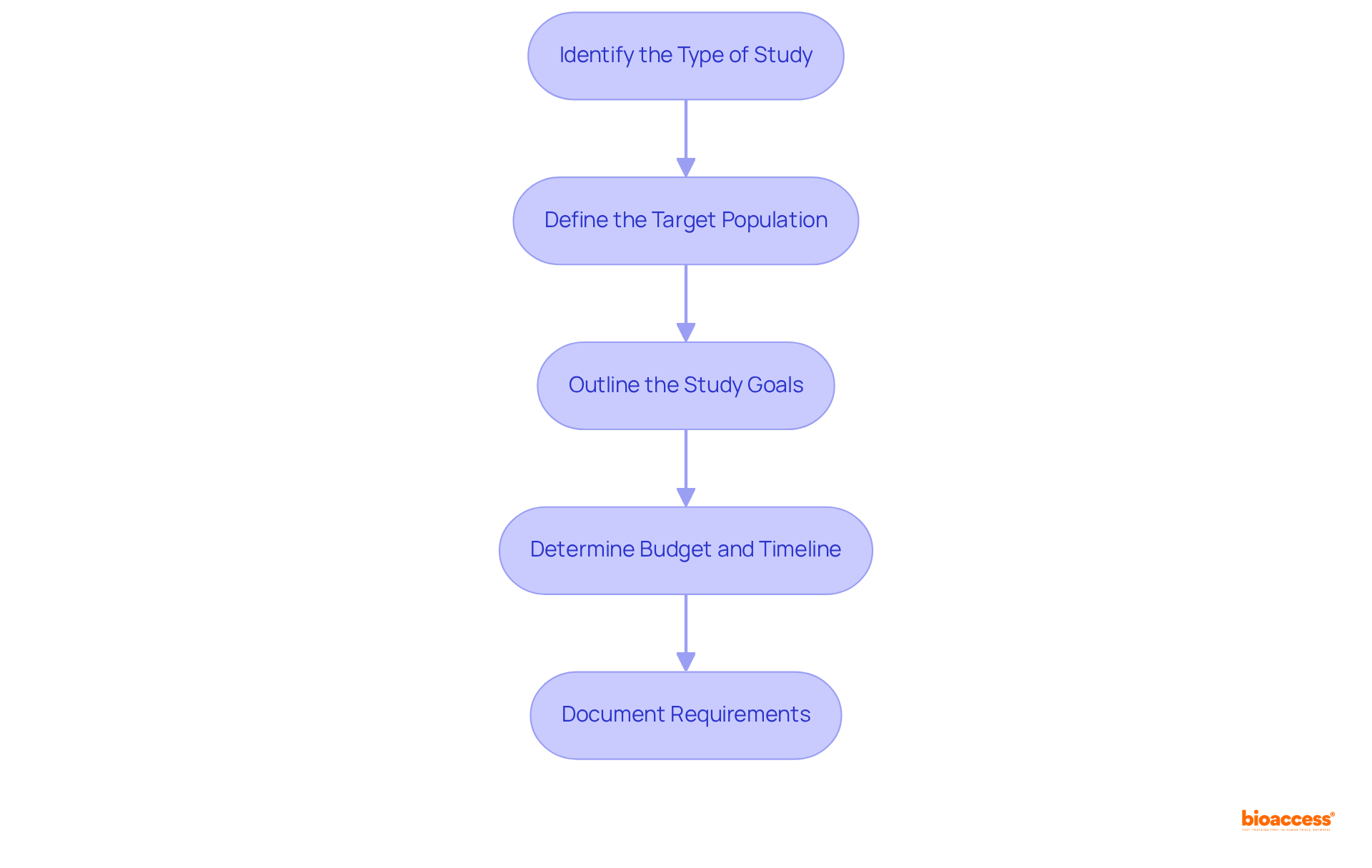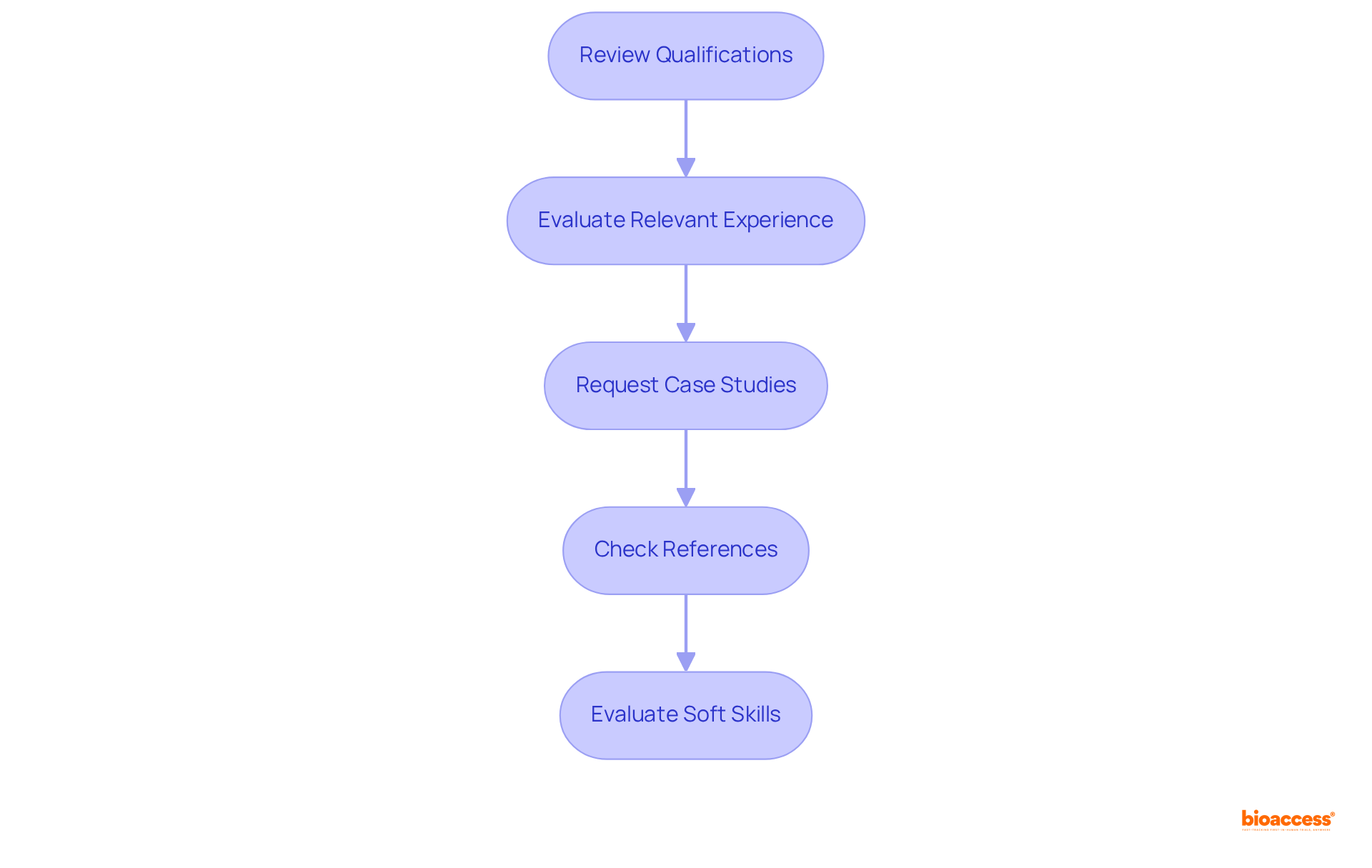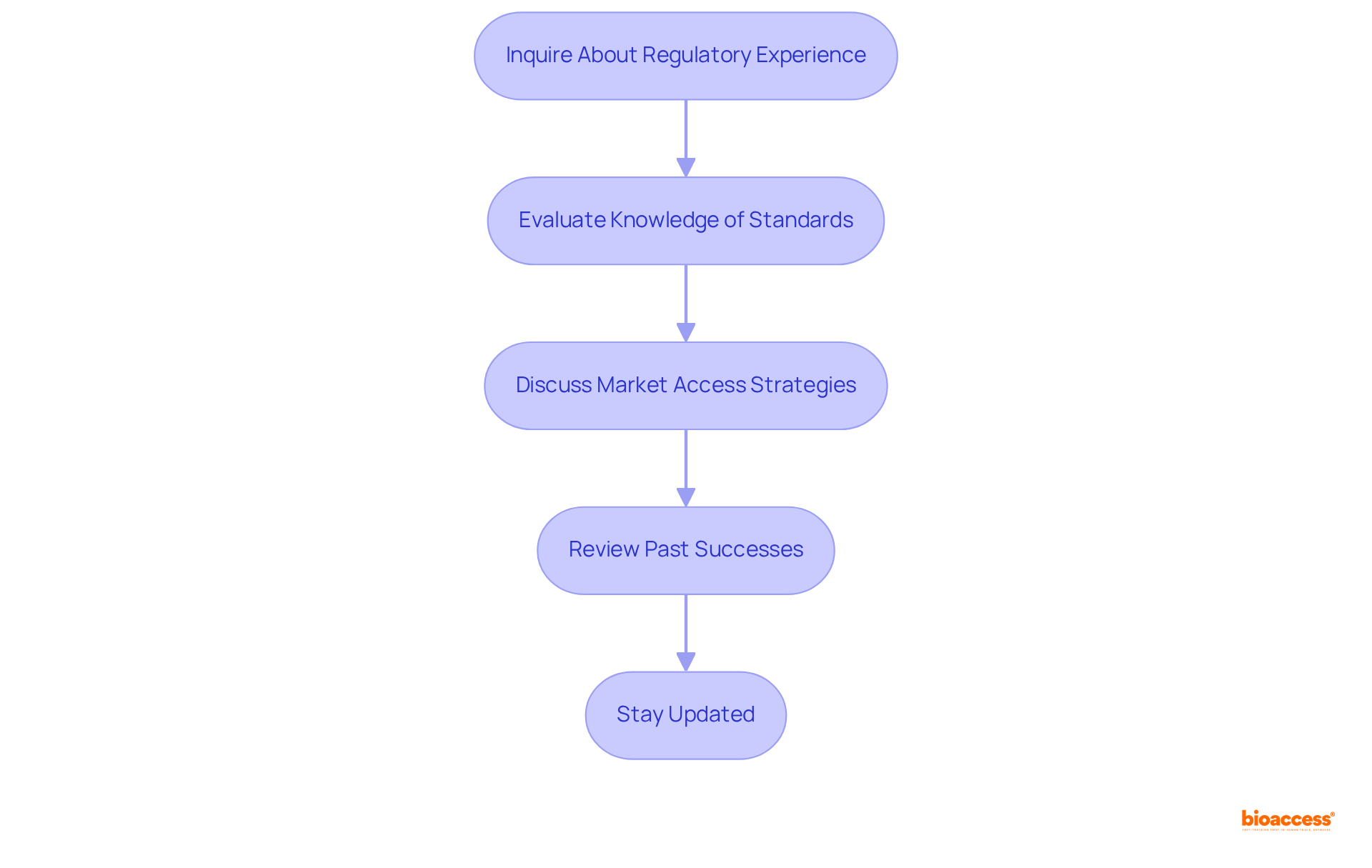


Selecting the appropriate medical device consultant necessitates a precise definition of your clinical research requirements, a thorough evaluation of the consultant's expertise and experience, and a careful assessment of their regulatory knowledge and market access strategies. This article delineates specific steps for each of these critical areas, underscoring the necessity of aligning project objectives with the consultant's capabilities. It is essential that the consultant possesses the requisite knowledge to effectively navigate complex regulatory environments, thereby ensuring successful project outcomes.
Choosing the right medical device consultant is a pivotal decision that can significantly impact the success of a project. Given the complexities of clinical research, regulatory compliance, and market access, navigating this selection process is essential.
What criteria should one prioritize to ensure that their chosen consultant not only meets regulatory standards but also aligns with the specific goals of their medical device initiative? This article delves into a structured approach to selecting a consultant, offering insights that can streamline the journey toward successful product commercialization.
To effectively define your research requirements, begin by outlining the specific objectives of your project. Follow these steps:
Identify the Type of Study: Determine whether your study will be observational, interventional, or a research trial. This classification will guide your selection of a medical device consultant, especially one knowledgeable in the distinct legal frameworks of Latin America.
Define the Target Population: Specify the demographics of your desired participants, including age, gender, and health status. Understanding the population is crucial for efficient patient recruitment, a service that bioaccess® excels in by connecting startups with leading research sites in the area.
Outline the Study Goals: Clearly articulate your aims, whether they involve compliance approval, market entry, or product validation. With bioaccess®'s expertise in regulatory approval and research site activation, you can expedite your trials and enhance your chances of a successful exit.
Determine Budget and Timeline: Establish a budget range and a timeline for your endeavor. This will aid you in selecting an advisor who can operate within these constraints, as delays in clinical trials can cost sponsors between $600,000 and $8 million per day.
Document Requirements: Create a comprehensive document that encompasses all the above points. This will serve as a reference when discussing your project with potential advisors, ensuring clarity and alignment on objectives.

When evaluating potential consultants, it is essential to follow these steps to ensure you select the right partner for your medical device project:
Review Qualifications: Examine their educational background and relevant certifications as a medical device consultant. A strong foundation in regulatory affairs and medical research is essential for navigating complex compliance landscapes.
Evaluate relevant experience by looking for a medical device consultant with a proven history in endeavors akin to yours, particularly within your specific medical device category. With over 20 years of experience in Medtech, bioaccess® exemplifies the depth of knowledge required to guide innovative companies through early-phase clinical research, including Early-Feasibility Studies (EFS), First-In-Human Studies (FIH), and Post-Market Clinical Follow-Up Studies (PMCF). Their expertise in compliance assessments and management further enhances their value as a reference point in your evaluation.
Request Case Studies: Inquire about previous assignments they have successfully completed, focusing on the outcomes achieved and the challenges faced. For instance, advisors who have successfully overseen regulatory timelines and compliance—essential elements of the process—can significantly boost your initiative's success. Avoid advisors who miss deadlines or fail to prioritize time-sensitive tasks.
Check References: Reach out to former clients to gather insights into their experiences with the advisor, particularly concerning communication and project management abilities. Effective communication is crucial; professionals who exhibit responsiveness and transparency are more likely to foster a fruitful partnership. Neglecting to check references and testimonials can lead to hiring advisors with inadequate performance or unprofessional conduct.
Evaluate Soft Skills: Assess their ability to communicate effectively and collaborate with your team. Strong interpersonal skills are crucial for navigating the complexities faced by a medical device consultant, ensuring that all parties are aligned throughout the project. Furthermore, consider the advisor's problem-solving abilities, as these are vital for addressing unexpected challenges and providing ongoing support beyond initial compliance with regulations.
By following these steps, you can make an informed choice when selecting a medical device advisor, ultimately facilitating a smoother compliance process and enhancing the likelihood of successful product commercialization.

To effectively evaluate a consultant's regulatory expertise and market access strategies, consider the following key points:
Inquire About Regulatory Experience: Assess their familiarity with essential regulatory bodies such as the FDA and EMA. The understanding of these agencies by a medical device consultant is crucial, as they significantly influence the approval process for medical devices.
Evaluate Knowledge of Standards: Confirm that the consultant is well-versed in relevant standards, including ISO 13485 and IEC 60601. Compliance with these standards is vital for ensuring product safety and effectiveness. A strong grasp of them can significantly enhance the likelihood of successful market entry.
Discuss Market Access Strategies: Engage in discussions about their approach to market access in your target regions. This includes understanding pricing and reimbursement strategies, which are essential for navigating the complexities of healthcare markets.
Review Past Successes: Request concrete examples of how they have successfully managed regulatory submissions and market access for previous clients. For instance, bioaccess® has demonstrated its capability by achieving ethical approvals in just 4-6 weeks and ensuring enrollment that is 50% faster than traditional markets, showcasing their effectiveness in facilitating rapid clinical research.
Stay Updated: Ensure that the advisor actively keeps abreast of changes in regulations and market dynamics. This proactive approach is critical, as evolving regulations can significantly impact project timelines and success rates. The success of your medical device development can be significantly influenced by a medical device consultant's ability to adapt to these changes.

Choosing the right medical device consultant is a critical step that can significantly influence the success of a project. By clearly defining clinical research requirements, evaluating the expertise and experience of potential consultants, and assessing their regulatory knowledge and market access strategies, organizations can ensure they select a partner who aligns with their specific needs and objectives.
Key steps outlined throughout the article guide the selection process. From identifying the type of study and target population to evaluating a consultant's qualifications, experience, and soft skills, each stage is essential for making an informed decision. Furthermore, understanding regulatory frameworks and market dynamics enhances the likelihood of successful product commercialization.
Ultimately, investing time and effort into choosing the right medical device consultant not only streamlines the compliance process but also positions a project for greater success. As the medical device landscape continues to evolve, staying proactive in selecting knowledgeable and experienced advisors will be paramount in navigating the complexities of regulatory approval and market access. Embrace these steps to ensure a collaborative partnership that drives innovation and meets the demands of the healthcare market.
How should I start defining my clinical research requirements?
Begin by outlining the specific objectives of your project, including identifying the type of study, defining the target population, outlining study goals, determining the budget and timeline, and documenting all requirements.
What types of studies can I classify my clinical research into?
You can classify your study as observational, interventional, or a research trial. This classification will help in selecting a suitable medical device consultant.
Why is it important to define the target population in clinical research?
Defining the target population is crucial for efficient patient recruitment, as it specifies the demographics of desired participants, including age, gender, and health status.
What are the study goals I should consider when defining my research?
Study goals may involve compliance approval, market entry, or product validation. Clearly articulating these aims can help expedite trials and enhance the chances of a successful exit.
How can budget and timeline affect my clinical research project?
Establishing a budget range and timeline is important as it allows you to select an advisor who can operate within these constraints. Delays in clinical trials can be very costly, potentially costing sponsors between $600,000 and $8 million per day.
What should I include in the documentation of my clinical research requirements?
Create a comprehensive document that encompasses the type of study, target population, study goals, budget, timeline, and any other relevant points. This document will serve as a reference when discussing your project with potential advisors.